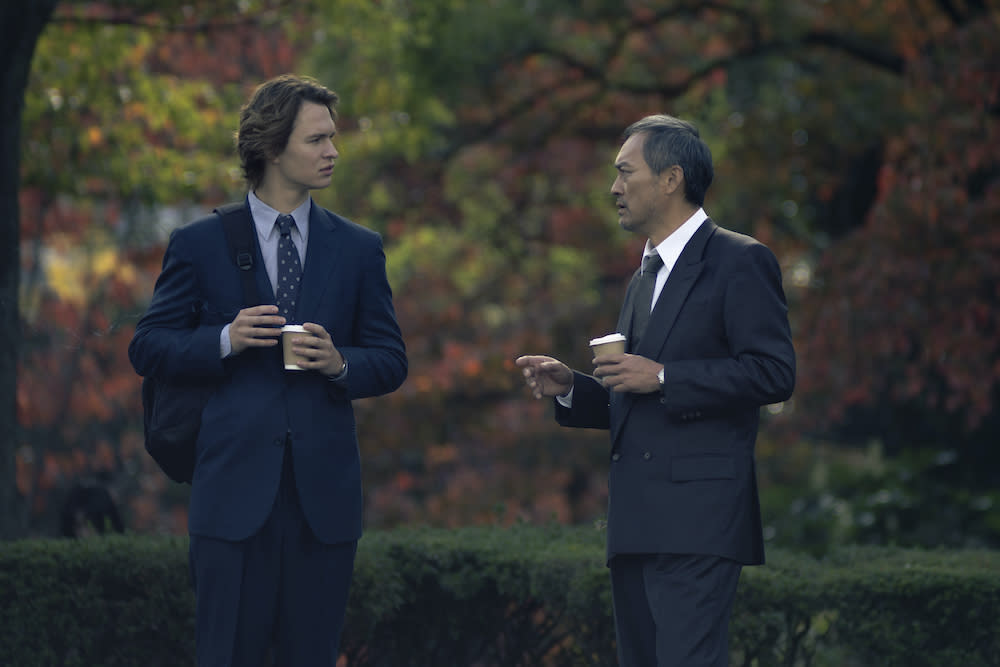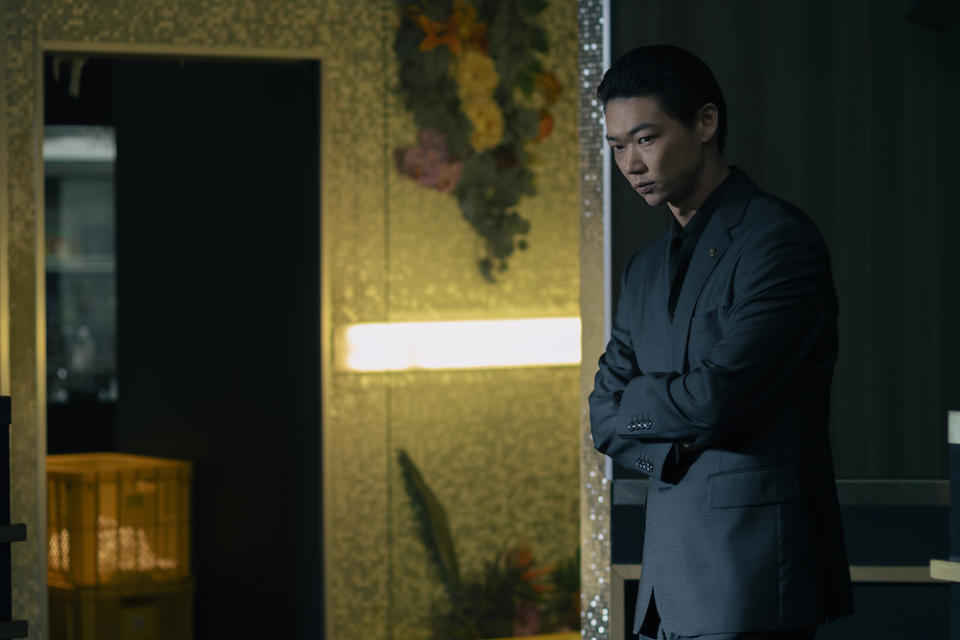‘Tokyo Vice’ Is a Mesmerizing Crime Story Built on Relentless, Perilous Passions

- Oops!Something went wrong.Please try again later.
Over the first half of “Tokyo Vice” Season 2, Ken Watanabe’s harried detective looks, to put it mildly, like absolute dogshit. Puffy bags threaten to swallow his eyes. Peppered stubble creeps across his chin and cheeks. Watch closely and you’ll swear you can see his hair falling out, one withered strand at a time. While likely frowned upon by his superiors, Detective Hiroto Katagiri’s shabby appearance is justified. At work, he’s been relegated to demeaning desk duty, promising clueless citizens he’ll find out where the yakuza has taken their cat. At home, he’s been living alone for months, smoking silently in an empty bed, gazing out into the darkness for any signs of danger — and danger is out there. His family is in hiding because, when not busy catnapping, the yakuza is threatening to kill them. If they feel Katagiri snooping around in their business, that’s it. His family is gone for good, while Katagiri is left to continue his slow, agonizing decay. One hair at a time.
Where many men would back off to protect themselves and their loved ones, that’s not an option for Katagiri. He can’t. He won’t. Walking away simply isn’t part of his composition, even when it’s the safest choice for everyone involved. Instead, he will find another way to bring the crime syndicate to justice. He will find another way to keep his family safe. For this man, the only way out is through.
More from IndieWire
Dakota Johnson Reflects on Her Short 'The Office' Stint: 'The Worst Time of My Life'
'Abbott Elementary' Returns with Surprise Time Jump - and Executes It Perfectly
Katagiri, like most characters in “Tokyo Vice,” is a classic Michael Mann archetype. His purpose — in this case, taking down the yakuza crime syndicate — is built into his bone marrow. It’s not just what he does, but who he is. Katagiri may know his family’s safety is paramount, but there’s no denying his calling. These two truths rage within him — just like his American counterpart, Lieutenant Vincent Hanna (Al Pacino) in “Heat,” whose obsession with catching criminals costs him three marriages, or Mann’s latest subject, Enzo Ferrari (Adam Driver), whose insatiable need to construct the fastest flying machines clashes with his devotion to the flesh-and-blood men driving his cars. (“Ferrari” really is brilliant — seek it out.) For these people, there is no one or the other. There is no compromise. There is only what must be done.
“Tokyo Vice,” the Max series set to return for its second season, relishes these internal conflicts, extending them into fragile relationships (where attraction overwhelms common sense) and alliances (when neutral or opposing parties have to find ways to work together). Some may simply call all this “conflict,” and they’d be right, but creator and showrunner J.T. Rogers roots his slow-burn of a crime story in roiling emotions, always on the verge of overheating, in ways that befit an ongoing, serialized medium. We’re drawn into their world slowly, steadily, and completely, until — like the compulsive characters — it’s impossible to imagine being on the outside again.
Season 2 treats its premiere like an epilogue to Season 1. Picking up after Jake (Ansel Elgort) shows Katagiri the recording of Polina’s (Ella Rumpf) death, the first hour spends half its time pinning needles into previous plots and the other half introducing new threads for our investigators to tug. Samantha (Rachel Keller) is left reeling once her friend’s violent end is confirmed, and she doubles down on opening her own hostess club as a safe place for her talented staff (and, to a lesser extent, their big-spending clientele). But taking start-up money from Ishida (Shun Sugata), head of the Chihara-kai yakuza clan, accrues higher interest than anyone can be expected to pay off and, like Katagiri with his sense of duty, her self-imposed plan puts the people she aims to protect in greater danger.

Adding to her deficits: Sato (Show Kasamatsu) can’t offer the protection she once expected from him. At first, he’s physically unable — as he recovers from the stabbing that nearly killed him last season — but later, he’s repeatedly torn between fealty and desire. With Samantha indebted to his boss, Sato can’t willingly refute Ishida to help his friend, just as he can’t obediently serve his oyabun if it means hurting Samantha. Once again, Sato is stuck, and once again, Kasamatsu captures his stretches of dejected desolation as stirringly as his fits of righteous fury. Sato may never say as much out loud, but he would trade in his yakuza brothers in a heartbeat if it meant living peacefully away from the criminal underworld. Knowing there’s no plausible path to such a place only makes him more desperate to find one. So, despite his better judgement, he brings his brother into the yakuza’s orbit and grows attached to a girlfriend’s young son.
Sato is our sweet sad boi, torn between the life he wants and the one he can’t escape. His ordinary dreams make him immensely relatable, despite his unique plight, but perhaps more importantly: He’s the only main character who actually wants out. Samantha may know she’s safer without ties to the yakuza, but this American expat chose to live in Tokyo, chose to become an in-demand hostess, and recommitted to the life by opening her own club. Jake similarly fled his Missouri home to report on gang killings in Japan, and he can’t help but continue to put himself at greater and greater risk to get the job done. (This season questions whether reporting on criminal activity is even enough for the adrenaline junkie.)
And then there’s Katagiri, the devoted detective and loving family man whose allegiance to both is ripping him apart (or ripping his hair out, at least). In a way, he’s the mirror image of Sato: Where Katagiri has to make the impossible choice between love and duty, Sato has no choice at all. Either way, it’s killing them. Slowly, then — unless things go their way — all at once.
“Tokyo Vice” relies on its actors to bring humanity to their characters’ unremitting contradictions as much as it depends on its directors to draw out the series’ rigorous style. Mann, who helmed the pilot, does not return for Season 2 (aside from his executive producer title), but Alan Poul (“Six Feet Under,” “The Eddy”), Josef Kubota Wladyka (“The Terror” Season 2), Takeshi Fukunaga (FX’s upcoming epic “Shōgun”), and others immerse us in an expansive vision of 1999-era Japan. Police stations are so clouded in smoke, prisoners could hide out in the haze. Open roads narrow and curve as if to invite collisions from the speeding cars and cruising cycles. Quiet isn’t hard to come by, be it in an elegant rooftop restaurant or peaceful stroll through the park, but it’s impossible to shake the feeling of being watched. The camera will glide down over the canal, onto a cruise ship, and threw it’s guarded corridors just as easily as it will pull back to reveal a bird’s eye view of a third-story bar or high-rise karaoke club. There’s no escaping the life. There’s no escape, period.
And as much as I want Jake, Samantha, and, most of all, Sato and Katagiri to make it out of this intact, I wouldn’t have it any other way.
Grade: B+
“Tokyo Vice” Season 2 premieres Thursday, February 8 on Max. Two episodes will be released initially, then one per week through the April 4 finale.
Best of IndieWire
Sign up for Indiewire's Newsletter. For the latest news, follow us on Facebook, Twitter, and Instagram.

